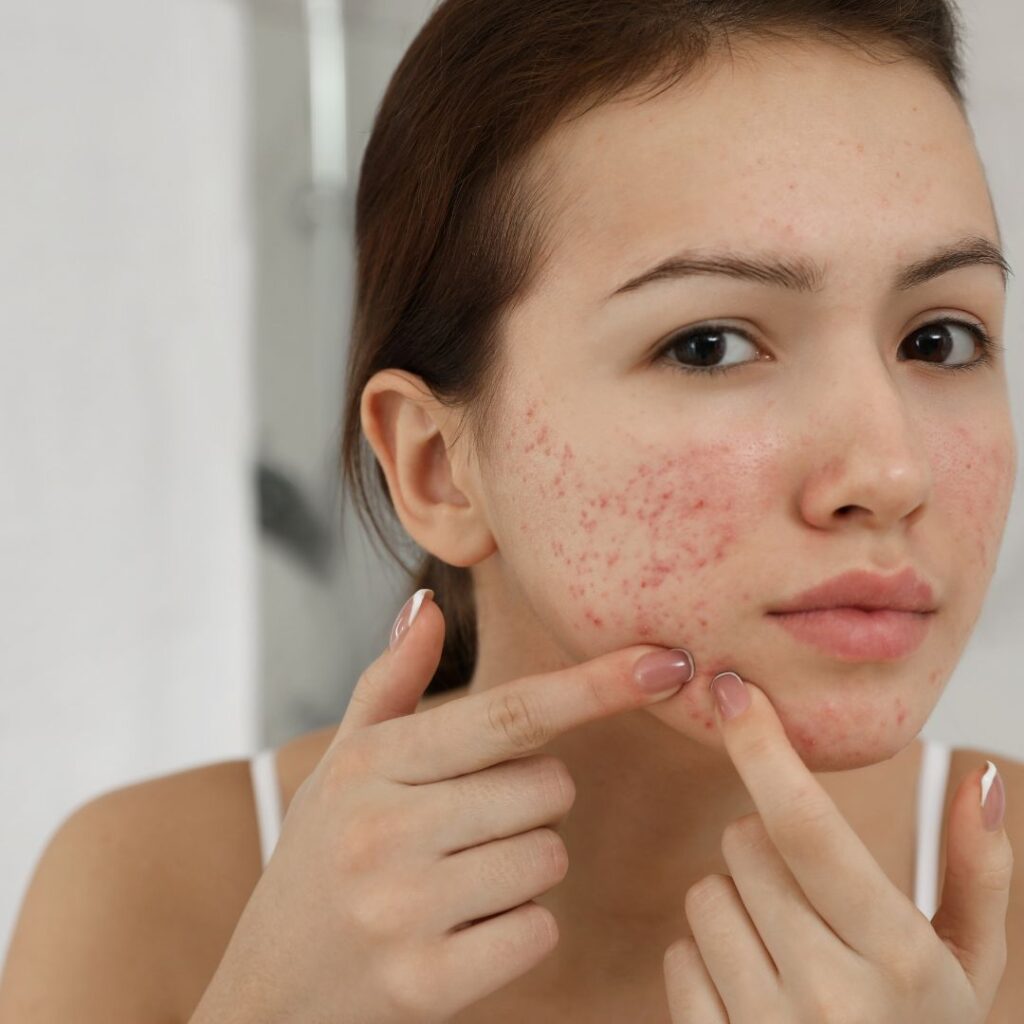Chronic Inflammatory Acne: Why it Happens and How You Can Treat It

As adults, we remember how easy life was as a teen. The stresses that come with adulthood are considerable in comparison. But then, if we recall acne, we remember that it was just plain miserable. It can seem like an uphill battle for teenagers and young adults with chronic inflammatory acne. But inflammatory acne isn’t exclusive to teens; many adults have it too. Learning why it happens and how to treat it will help you or your teen reduce or eliminate it.
Pimples come in two varieties – inflamed and not inflamed. The most common types of acne that are noninflamed include whiteheads and blackheads. Inflamed acne, however, will appear red, swollen, and can be tender. Inflamed acne breakouts occur deeper in the dermis (skin) than in the noninflamed variety.
One of the most common questions dermatologists and skincare professionals receive is, “why do I have acne?” The answer boils down to clogged pores. The skin is constantly shedding. Both inflamed and noninflamed acne are the result of clogged pores. However, the pores are deeply clogged with oil, debris, and dead skin cells with inflamed acne.
There are five primary types of inflamed acne, and depending on which you have (and you may have several), treatment will vary.
- Inflamed comedones are swollen blackheads and whiteheads.
- Papules are red, swollen, and pus-filled bumps that appear on the skin’s surface (as opposed to below the surface of your skin.
- Pustules are papules’ bigger brother. They are red, swollen, pus-filled bumps but are more prominent than papules.
- Nodules are bumps that are pus-filled and are located below the skin’s surface.
- Cysts are considered to be the most severe form of acne. They sit below the skin’s surface, are large and pus-filled, and are generally tender to the touch.
How to Treat Inflammatory Acne
The most critical first step is to cleanse the skin thoroughly. Acne, as mentioned, is caused by clogged pores. Taking the steps needed to cleanse and exfoliate the skin will help remove dirt and dead skin cells from the skin to help reduce acne outbreaks. Never pop your pimples, as it can cause acne to spread, and that just makes a problem that much more significant.
Some things you can do at home include:
- washing your face in the morning and before bed with a gel-based cleanser,
- use benzoyl peroxide as a spot treatment as it will kill p.acnes bacteria,
- apply an oil-free moisturizer to the skin.
Another treatment to consider is salicylic acid, which helps remove dead skin cells inside the pores. It can also help break down inflamed acne lesions.
Amani MedSpa can also help! We can prescribe prescription-strength topical retinoids that help shed the skin. For cystic acne, isotretinoin may be prescribed; however, this is typically reserved for when topical retinoids aren’t effective.
We also offer Vi Purify Peel, which effectively improves skin’s overall look by removing dead skin cells, killing p acnes bacteria, decreasing sebum (oil) production, and unclogging pores.
Other treatments at Amani MedSpa include Clarifying Hydrafacial, which extracts impurities while thoroughly cleansing and hydrating the skin. We use Blue LED light therapy during the treatment to kill acne-causing bacteria.
One of our favorite acne treatments is Neo Clear by Aerolase. This treatment uses laser light therapy to control sebum production, kill p acnes bacteria, and decrease inflammation. It also helps reduce the appearance of acne scars.
Other treatments that help Candela CO2RE fractional laser and eMatrix Sublative laser are great options for helping eliminate or reduce acne scars.
You can learn more about the acne treatments available in Valrico, FL, here.
Call us to schedule an appointment if you’d like to see how Amani MedSpa can help treat your inflammatory acne. During your appointment, we will assess your skin and discuss your goals. We will then make recommendations to help you achieve healthier, more beautiful skin.

